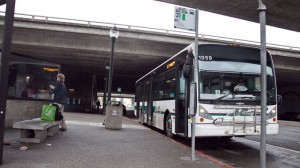The AC Transit Board of Directors unanimously approved the agreement.
AC Transit board member Elsa Ortiz said the parties came into Tuesday's talks determined to make a deal.
"I think one of the things that helped both sides reach an agreement was that we were very respectful of each other. We were very professional and very courteous, so I think that created an environment conducive to reaching an agreement."
About 181,000 trips are taken daily on the transit system.
Update, 8 p.m. Tuesday:
The latest: AC Transit management and union leaders are continuing negotiations in order to avert a walkout that could begin at 12:01 a.m. Wednesday. A press release from AC Transit said the two sides are very close to an agreement:
"Most notably, on the key issues of wages and health care, the distance between the two parties has narrowed substantially. On wages, AC Transit is proposing a nine percent (9%) wage increase over the life of a three-year contract while the ATU now seeks a nine point seventy-five percent (9.75%) wage increase over the same period of time.
"On the more sticky matter of ATU employees making contributions toward health care costs, there is only a ten dollar ($10.00) difference between the two parties. Both the District and ATU agree on monthly contributions of $70 and $180, respectively, for the first and third years of the contract. However, during the second year of the contract, AC Transit is hoping for $145 monthly contribution while the union is offering a $135 monthly payment.
But despite the narrowing gap in the talks, Local 192 President Yvonne Williams said via Twitter that a report in the Oakland Tribune that the two sides "might have reached a tentative pact" was premature.
The AC Transit Board of Directors met earlier this evening in closed session to review the status of negotiations. KQED reporter Andrew Stelzer said a one-minute-long public board meeting included a union representative saying during audience comment, "I hope there is an agreement."
AC Transit provides service to 13 cities and unincorporated areas in Alameda and Contra Costa counties, as well as transbay service via the Bay Bridge to San Francisco. Buses also cross the Dumbarton and San Mateo bridges. The transit system has been locked in months-long negotiations with Amalgamated Transit Union Local 192.
The union’s current contract expired on July 1, but workers chose not to strike at the same time as BART. Amalgamated Transit Union Local 192, which represents 1,625 mechanics and bus operators, notified the board about a possible work stoppage on Monday.
What's at Stake?
AC Transit has offered the union a 9 percent salary increase over three years and wants union workers to pay 10 percent of their health care premiums -- what other district employees pay. The union wanted a 10.5 percent raise and to phase in health care payments at a "reasonable level," but didn't share details about what that might mean.
AC Transit spokesman Clarence Johnson said he's optimistic an agreement with the union can be reached by midnight tonight, despite the gaps on the wage hike and health care plan contributions.
"We're now only about $4 million apart, as of last night," Johnson said. "We're about 1 percentage point apart in our wage proposals. We're offering 9 percent. The union is now seeking 10 percent."
Johnson said a strike would be "catastrophic." About 181,000 trips are taken on AC Transit daily.
Ted Miller, who said he's been an AC Transit bus driver for 25 years, showed up at an AC Transit press conference Tuesday morning to correct what he called misinformation. He said safety and wages are the big concerns.
"We haven't had a raise in almost 15 years. And the raise that they so-called are offering is absorbed by the additional medical payments that they want us to pay," Miller said. "They want us to pay somewhere in the neighborhood of 10 percent of the total costs, which would eat up the entire 9 percent that they're asking."
Both sides have been talking through a state mediator. Johnson was uncertain whether overnight bus service would end at midnight if a strike is called. He said that would be up to the unions.
Reliance on AC Transit
Michelle Lynee has a medical condition that requires frequent visits to the doctor. She was running critical errands Tuesday in case there's a strike tomorrow.
"I am totally dependent on AC Transit and BART," Lynee said, while waiting for an AC Transit bus in downtown Oakland.
"I'm doing my little bit of shopping. I'm stopping at Kaiser to drop off some forms," Lynee said. "I'm doing it today so that the important stuff is done, and then tomorrow I'll just be in. I'll just be at home."
Listen to the story:
